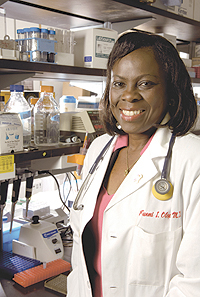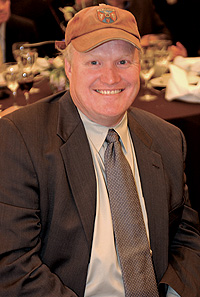Murphy, Olopade receive MacArthur ‘genius’ grants
By John Easton, Allan FriedmanMedical Center Public Affairs, Graduate School of Business
 Funmi Olopade  Kevin Murphy | |
University professors Olufunmilayo Falusi Olopade and Kevin Murphy have been named 2005 MacArthur fellows. They each will receive $500,000 in “no strings attached” support over the next five years under terms of the award from the John D. and Catherine T. MacArthur Foundation.
Olopade, Professor in Medicine and Human Genetics and Director of the Cancer Risk Clinic at the University Hospitals, was selected for “translating findings on the molecular genetics of breast cancer in African and African-American women into innovative clinical practices in the United States and abroad.
“In bridging continents with her innovative research and service models,” the foundation said, “Olopade is increasing the probability of improved outcomes for millions of women of African heritage at risk for cancer.”
Murphy, the George J. Stigler Professor in Economics and the Graduate School of Business, was selected for “revealing economic forces shaping vital social phenomena, such as wage inequality, unemployment, addiction, medical research and economic growth.”
As a scientist, Olopade has a special interest in women of African ancestry, who are at higher risk for a more aggressive type of breast cancer and more likely to be diagnosed at a younger age. She recently found that breast cancers in African women often produce a pattern of gene expression that is significantly different from that seen in Caucasians.
As a clinician, her interests include finding and testing improved methods for prediction, prevention and early detection of cancer for moderate- and high-risk populations. In the Cancer Risk Clinic, which she started in 1992, Olopade coordinates preventive care and testing for healthy patients and their families who, because of genetics or family history, are at increased risk for cancer.
Olopade received her M.D. in 1980 from the University of Ibadan, Nigeria, and served as a medical officer at the Nigerian Navy Hospital in Lagos. In 1986, she completed an internship and residency at the Cook County Hospital in Chicago, and trained in hematology and oncology as a postdoctoral fellow at Chicago, where she has been a member of the faculty since 1991.
Murphy’s work “challenges preconceived notions and attacks seemingly intractable economic questions, placing them on a sound empirical and theoretical footing,” the foundation said.
Early in his career, Murphy identified how trends in wage inequality reflect underlying changes in demand for labor. Murphy also considered the phenomenon of addiction from an economic perspective. More recently he has shown that, particularly for conditions such as heart disease and cancer, investment in basic health research and care results in orders of magnitude returns in economic value.
Murphy became a lecturer in the GSB in 1983 while he was a Ph.D. student in the University’s Economics Department. He was appointed Assistant Professor when he received his Ph.D. in 1986, Associate Professor in 1988 and Professor in 1989. Murphy received his named chair appointment in 2002, and the distinction of Distinguished Service Professor in January 2005.
Murphy is the recipient of the 1997 John Bates Clark Medal, which is given every two years to the most outstanding American economist under the age of 40.
More than 60 of Murphy’s research papers have been published in scholarly journals and he has written two books: Measuring the Gains from Medical Research: An Economic Approach (University Press, 2003), and Social Economics: Market Behavior in a Social Environment with Gary Becker, a professor of economics and Nobel Laureate, and Edward Snyder, Dean of the GSB and the George Pratt Shultz Professor of Economics in the GSB.
Olopade and Murphy join 23 other recipients of the award this year in fields as diverse as documentary filmmaking and neurobiology. Nineteen current or former faculty member at the University have been named MacArthur fellows.
The MacArthur Foundation’s criteria for the awards, popularly known as “genius grants,” include exceptional creativity and promise for important future advances based on a track record of significant accomplishment. The unusual level of independence afforded to the fellows underscores the spirit of freedom intrinsic to creative endeavors. Candidates are nominated, evaluated and selected through a rigorous and confidential process.
![[Chronicle]](/images/sidebar_header_oct06.gif)